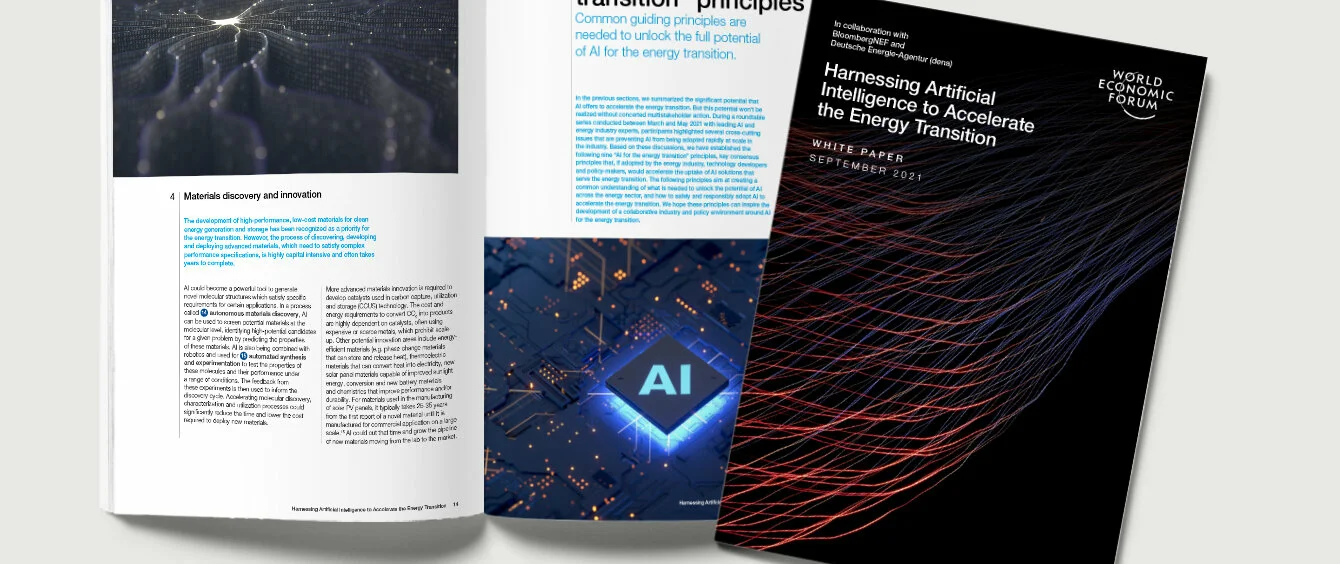The energy sector is changing. Innovation in industry and the supply of energy are paramount to curbing the effects of climate change and achieving carbon neutrality. Digital technologies play an especially important role, as they are a major driver of the energy transition. In addition, they can contribute to reaching targets faster, while cutting costs. This is the verdict reached by a current study by BloombergNEF (BNEF) and the German Energy Agency (dena) commissioned by the World Economic Forum.
Experts see great potential above all in artificial intelligence (AI) – in other words software programs – that are capable of identifying data patterns, deriving findings from them, and ‘learning’ from the results. However, such programs have only been used in a few pilot projects thus far. This explains why the study looks into how to strengthen trust in the technology. In addition to a roadmap and an overview of the key application options, it makes subsidy and implementation recommendations for both politics and industry.
Artificial intelligence could enable billions in savings
Efforts to decarbonise the global energy sector and the resultant progressive electrification and decentralisation will require increased interaction among the individual sectors, requiring electricity, transportation, industry and construction to work hand in hand. Optimal management of this system mandates a high degree of flexibility. Enter artificial intelligence: according to the study, AI can help connect the sectors to each other and save costs.
In view of the substantial investments required to roll out the energy transition, this speaks strongly in favour of AI. Artificial intelligence could be used to reduce demand during peak load periods by optimising plant and industrial power consumption by means of smart management systems or to minimise servicing costs through predictive asset maintenance. According to the study, this could result in billions in savings. The experts estimate that every one percent demand-side efficiency gain could translate into 1.3 billion US dollars in reduced expenditure – thanks to increased levels of energy efficiency and flexibility. After all, improved ease of planning and optimised capacity utilisation help to spare resources and lower investment.
Potential of AI adoption higher than widely recognised
Artificial intelligence is already being deployed in several promising pilot projects in the energy sector, for instance in predictive asset maintenance, and to stabilise the grid by forecasting load spikes. But in fact, the programs can do more. Experts believe AI potential is much higher than is widely perceived at present. They break down potential fields of application into three categories:
- Identification of patterns and data and derivation of findings for electricity generation from renewables
- Co-ordination and optimisation of power systems and grids
- Management of demand for energy and of the distribution of available resources
Common principles required to fully unlock AI potential
However, the analysis finds that innovation and collaboration at the technological level are mandatory if AI is to flourish unrestricted. The authors believe that it is thus paramount to strengthen industry’s trust in digital tools. This is why the experts divide the shared guiding principles into the three following categories: governance, design and enablement. The primary objective is to establish a common understanding of the elements necessary for the efficient adoption of AI in the energy sector. As a result, these principles could help industry make safe and responsible use of artificial intelligence with a view to accelerating the energy transition.
At the end of the study, the business and political arena are urged to actively promote the use of AI in the energy sector and to reliably institutionalise the technology. The authors conclude that, in the final analysis, this is the only way to create an environment conducive to fully unleash the potential of AI systems.
